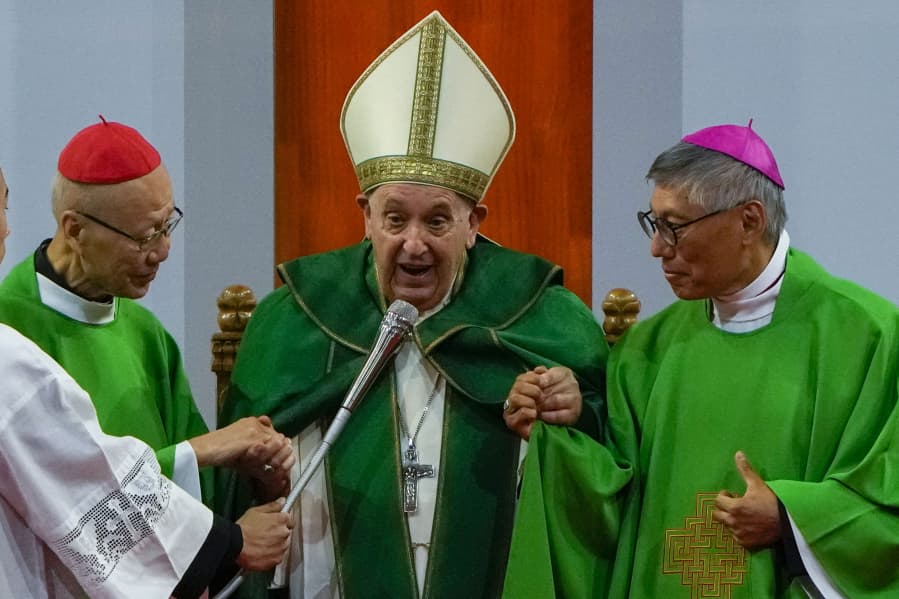ROME – Cardinal-designate Stephen Chow of Hong Kong, who will receive his red hat from Pope Francis Saturday, has voiced his belief that the Vatican’s approach to dialogue with China is working, and that perceptions it is naïve are wrong.
Chow also said he is happy that two bishops from mainland China will participate in the upcoming Synod of Bishops on Synodality, and sees it as progress in terms of Vatican-China relations.
Referring to the participation of the two bishops at a Sept. 28 press point with journalists, Chow said, “We are very happy about that.”
Asked whether he thought their presence was indicative that the Vatican’s engagement with China is working, he said, “I hope so, but certainly, it’s a positive sign from the Church in China and the government.”
“They realize it’s important for the episcopacy in China to have more connection with the universal Church, with the episcopacy here. So, I hope, and I hope also that they will stay through the synod meeting,” he said.
The Chinese bishops who will participate in the synod are Bishop Antonio Yao Shun of Jining-Wumeng, in Inner Mongolia, and Bishop Giuseppe Yang Yongqiang of Zhoucun in Shandong.
While set to attend at least part of the Oct. 4-29 synod, some observers believe they will leave before the synod concludes.
Chow also addressed rumors that he is expected to return to Beijing as soon as November, following a historic visit in April.
He made a five-day visit to Beijing from April 17-21 alongside Hong Kong auxiliary bishop Joseph Ha and the diocesan vicar general, Father Peter Choy, as well as his personal assistant, after being invited by Beijing Bishop Joseph Li Shan sometime last year.
The visit marked a significant milestone, as it was the first time a Hong Kong bishop traveled to Beijing since 1985, when Hong Kong was still a British colony.
For decades, Hong Kong has been a Catholic stronghold on the edge of mainland China, where Catholics and members of other religions have at times faced persecution under the officially atheist Chinese Communist Party rule.
For years, the Vatican has sought to establish stronger ties with China, and in 2018 they signed a provisional agreement with the Chinese government on the appointment of bishops aimed at unifying the official, government-sanctioned church and the so-called “underground” church loyal to Rome.
While that deal has repeatedly been violated by Chinese authorities, Pope Francis has gone to great lengths to reach out to China, praising them publicly and sending clear messages of assurance during his Aug. 31-Sept. 4 visit to Mongolia.
On that occasion, the pope in his closing Mass praised the “noble Chinese people” and told Chinese Catholics to be both good Christians, and good citizens.
Pope Francis, as the world’s first pope from the global south who is generally suspicious of global western influence, has also potentially drawn more openness from the BRICS nations – Brazil, Russia, India, China and South Africa, and now also Argentina, Egypt, Ethiopia, Iran, Saudi Arabia and the United Arab Emirates – given his stance on issues such as the economy and the war in Ukraine.
His personal peace envoy for Ukraine, Italian Cardinal Matteo Zuppi, recently concluded a whirlwind visit to Beijing that was hailed as a great success not only because he was welcomed, but also because he met with high-level official Li Hui, the Chinese Special Representative for Eurasian Affairs.
In reference to his return visit to Beijing, Chow said that he will go not to meet with Li Shan, but for “other meetings.”
“The more we go, we will have more contacts. I will probably go into China to visit other dioceses, that’s for sure, because they invited me, they said come, see all the dioceses if you want. That’s very generous of them,” he said.
However, with 97 dioceses, Chow said he doubted that he would have time to visit all of them, but said his return visit is “just to know more, to see how we can have more exchange.”
Further exchanges are already being planned with the Diocese of Beijing “to see how we can have more collaboration, in the formation of clergy, etc. There’s a lot to build on, it’s very exciting. And we pray, we always have to,” he said.
“People will say that we’re naïve, but we always have to have some optimism, some positive things,” Chow said, saying, “They also have good people, they also have goodwill, they also want to see something good happening, and we do.”
“So, when the good meet together and encounter, beautiful things can happen,” he said.
In terms of his appointment as a cardinal, Chow said it was a “surprise” and that even though sitting bishops of Hong Kong receive a red hat, “I don’t think we should assume the Holy Father would continue.”
Chow said he hopes his presence bring diversity to the College of Cardinals, noting that Hong Kong has traditionally been “a bridge between east and west, and so is the Church, between the Church in China and the universal Church, and we would like to see that come closer.”
Follow Elise Ann Allen on X: @eliseannallen














